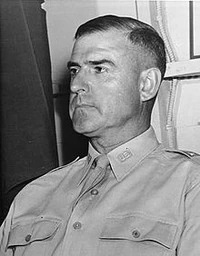|
General of Final Command | |
| Predecessor | Rank created |
|
Member of the US Army | |
| Born | 11th April 1910 Frankfort, Kentucky, United-States |
| Spouse | Clara McCollum (1933-1936) |
| Profession | Military Officer |
Hudson McCollum is a military officer as well as the leader of the paramilitary organization known as Final Command, which believe to be the only surviving part of the US Army, refusing to recognize any other government as the surviving American administration.
Before the Nukes, he was a highly ranked officer in the US Army, achieving the rank of Major General in 1959, which lead to his affectation in Fort Riley the following year.
Youth and Early Life[]
Hudson McCollum is born in Frankfort, Kentucky as the second son of Richard Vincent McCollum and his wife Evelyn McCollum. Born into a family which had close tied with the army since the Civil War, where Hudson great-grandfather George McCollum served as lieutenant in the last year of the war, and remained in the army until 1883.
Hudson and his older brother Henry lost their father in 1918, who died in the last days of World War I. Because of this, Hudson and his family had to go live with his maternal uncle, a rich lawyer who helped them in time of need.

Clara McCollum and their dog, Chester.
At first, Hudson decided to go to college instead of joining the army immediately like his brother did. There, he met Clara Peterson, with who he grew close enough to marry her when they were both 23. They bought a house in Virginia, where Hudson was studying, and took a dog they named Chester.
However, only three years after their marriage, Clara died in a fire, which also destroyed their house. This tragedy caused him to join the army, hoping he would find something to help him forget the disaster that happened in his life.
Military Career[]
Because of his uncle's influence and of his studies, he was able to make it rapidly into the hierarchy of the US Army, although it was his talent to keep the discipline among his men that truly made him shine. However, he was perceived as a distant man, who had little to no sense of humor and who was always serious.
By the time the US Army entered World War II, he was already Warrant Officer. He served in the European campaign against Nazi Germany, were he received distinctions, especially during the last months of the war. Two years after the end of WWII, he was being promoted Major.
He stagnated to this rank until the Korean War, where he was able to achieve the rank of Lieutenant Colonel, then Colonel. However, he was recalled early for reasons he never truly understood.
In 1959, he achieved the rank of Major General. However, it was made clear to him that he would achieve anything further due to his lack of relations in the administration and his lack of fame to the public. He was then affected to Fort Riley the following year, where he would stay until the Nukes. There, he gained respect for the First Lieutenant David Cohen, who helped him adapt to the life in Fort Riley.

